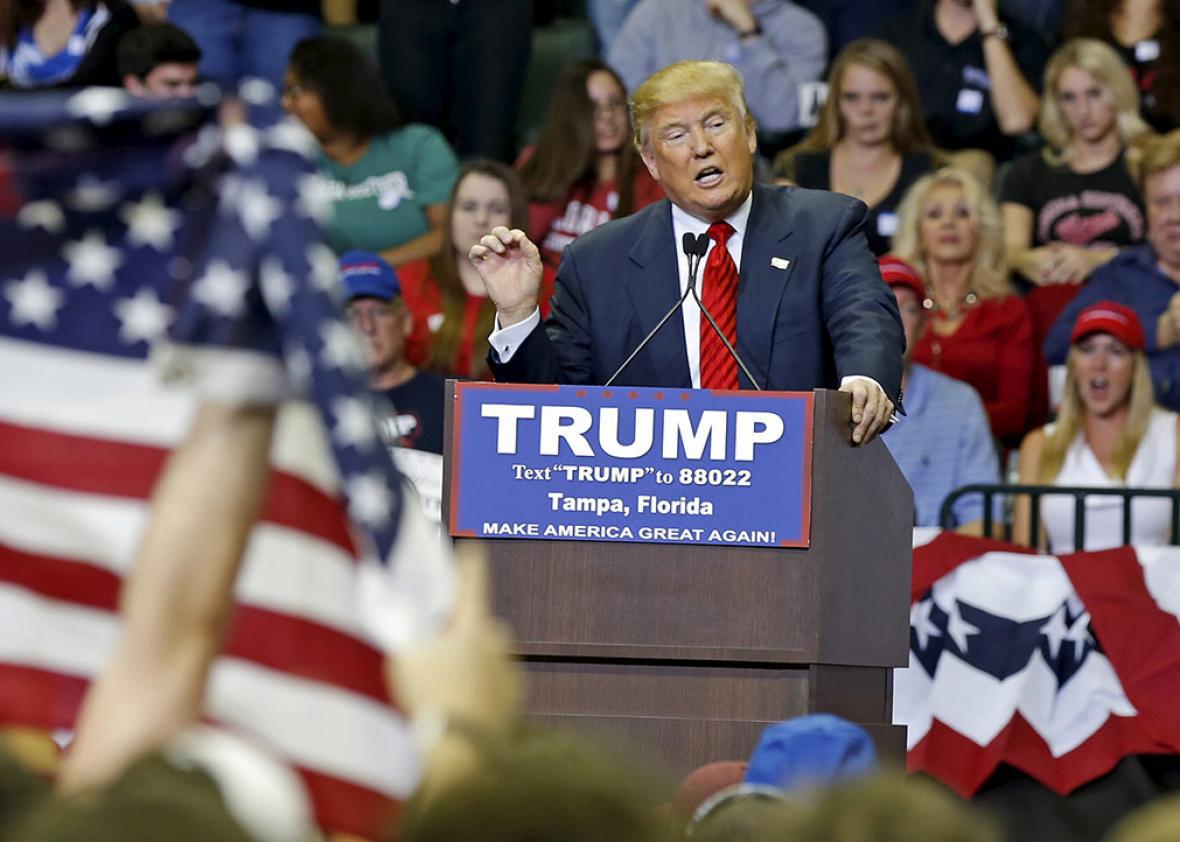Donald Trump is set to win most of the contests on Super Tuesday, with a couple of potential surprises. He could pull off an upset in Texas against Ted Cruz, though Cruz appears to have retained his lead there even if Trump has slimmed the margin. It would behoove Marco Rubio, meanwhile, to win any state—perhaps Minnesota—just to show that he is capable of winning a nominating contest at some point.
A surprise winner here or there would mostly serve PR purposes for campaigns. But proportional delegate allocation—which differs in specifics by state—ensures that no candidate will be able to deliver a structural shift in the campaign Tuesday night, even though Super Tuesday awards roughly a quarter of the party’s total delegates. Trump should win a few hundred delegates, Cruz another hundred or two. Marco Rubio, the supposed savior, will likely be stuck in double-digits. Cruz will use his delegate advantage over Rubio as a justification for staying in the race, even if Cruz’s prospects sharply diminish after the contests in Kansas, Kentucky, Louisiana, Mississippi, and Idaho on Saturday and next Tuesday.
In other words, the day after Super Tuesday—“Wednesday,” our sources tell us it’s called—will feature the same race we saw before and during Super Tuesday. Trump will have a big but not insurmountable lead. Rubio, Cruz, and Kasich will each be spinning about how they should be the figure to go one-on-one against Trump. Rubio will continue knocking the hell out of Trump in the hope that he can win his home state of Florida. Kasich will be off doing his Kasich thing in Michigan and Ohio, praying that Trump knocks out Rubio in Florida. Cruz will putz around the South through March 8, and then pivot to praying that Trump knocks out Rubio in Florida.
As you can see, Florida, which votes on March 15, is a fairly important contest. One can argue—as I am doing—that Florida is more important to the race than the sum total of Super Tuesday’s contests. It’s not just that Florida—along with other major states like Ohio and Illinois—comes on the first day of pure winner-take-all contests. It’s the test for whether Rubio, the candidate rumored to have the broadest ability to take down Trump, can do it.
Florida is Rubio’s home state, though that’s not quite the advantage that it may seem. It helps with campaign infrastructure and know-how, but Rubio is not measurably more popular than Trump there. Trump also has ties to Florida, owning several resort properties there, and his massive lead in the Super Tuesday state of Alabama bodes well for his ability to accrue votes in the Florida panhandle. Rubio’s home-state advantage, in short, is canceled out by the competing fact that it’s also a state that fits Trump quite well. Hence Trump’s significant lead.
Florida will serve as a microcosm for what needs to happen nationally to stop Trump from winning the nomination. It will effectively be a one-on-one contest. It will be expensive, with the Rubio campaign, its super PACs, and establishment-aligned conservative dark-money groups deploying possibly tens of millions of dollars against Trump from every angle of attack. Rubio’s kitchen-sink strategy against Trump has only been underway for five days, so looking at Super Tuesday’s results to gauge their effectiveness doesn’t give them enough time to settle. By Florida, we’ll know if they work or not. If they do, and Rubio wins Florida, we’ll know Rubio can beat Trump if the campaign is waged properly. This would reverberate in the remaining big contests across the country. Even if the math might be difficult for Rubio to win an outright majority of pledged delegates by that point, he could deny Trump his own majority and take his case to a contested convention.
If Rubio loses Florida, though, the race is over. His own campaign team has said you can “take it to the bank” that Rubio will win there. If Rubio can’t pull it off, he will be humiliated. More importantly, he will be almost insurmountably behind Trump’s delegate total, even after he’s launched everything he had at the front-runner. He, along with Cruz and Kasich, could stay in the race for second-place bragging rights—or in the hope that, say, Trump realizes he’s going to be the nominee and drops out because he never actually wanted to be president.
Tonight, as the Super Tuesday results are rolling in, Trump will hold a press conference at Mar-a-Lago, the estate he owns in Florida. He may declare the race over after his Super Tuesday romp. It won’t be. If he wins Florida on March 15, though, it’s done.
Read more Slate coverage of the GOP primary.
